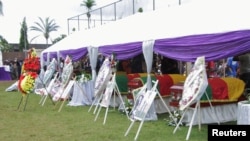Cameroon authorities have deployed troops in the capital Yaoundé to fish out armed men they say are trying to destabilize the government. Several bombs have exploded in Yaounde over the past two months, injuring at least 22 people. Some officials are implying that opposition parties are behind the attacks.
Cameroon’s 10 regional governors, at a meeting Monday in the capital, agreed that increasing incidents of bombings in the city must be addressed.
Naseri Paul Bea is governor of Cameroon’s Center Region, which includes Yaoundé.
He said for the past year, hardly a week goes by without arrests for illegal possession of weapons or planting bombs in public places.
He said security forces he has deployed will carry out systematic inspections to areas hosting criminal suspects. Bea said people and vehicles will be systematically controlled at all entry and exit points to Yaoundé. He said they have also prohibited people from taking large bags and packages to popular spots and public buildings.
Bea did not say how many more troops were deployed in Yaoundé but, residents have noted increased police check points.
Cameroon has an ongoing separatist conflict in the west and Boko Haram militants active on the northern border. However, the governors did not blame any specific group for the security threats.
In contrast, the speaker of Cameroon’s lower house of parliament Cavaye Yegui Djibril on Monday linked bombings in the capital to the political opposition.
He told lawmakers they needed to guard against plans to destabilize the country.
Djibril said anyone who wants to be president should wait for the next presidential election in 2025 instead of starting violence.
The opposition denies any role in the bombings and has asked the government to investigate.
However, the head of Cameroon’s Socialist Democratic Party, Prince Ekosso, said those tired of President Paul Biya, in power since 1982, might be taking up arms.
"This regime for 38 years now has concentrated itself in destroying opposition voices in this country. When opposition parties are rising up, the regime concentrates in stifling the ideas of opposition, creating situations that keep on vexing the Cameroonian people," said Ekosso.
Cameroon’s government has yet to accuse any suspected groups of being behind those arrested with weapons or bomb-making materials.
University of Dschang political analyst Leonard Ejani Kulu said officials are careful not to blame the opposition MRC or anglophone separatists, who call themselves Ambazonians.
"Just imagine a situation whereby this allegation is made against the MRC party, what will be the repercussion? Just imagine that this claim is made against the Ambazonian fighters. It will be that the Ambazonians are succeeding to penetrate Yaoundé and that can give a kind of stigma among Francophones and Anglophones," he said.
Security analyst and former military spokesman Didier Badjeck said, regardless of who is responsible, the government should negotiate a peaceful end to the security challenges.
He spoke on state media Cameroon Radio Television (CRTV).
Badjeck said it is imperative for the government to investigate the political and or ideological issues that are making people to resort to weapons as solutions to their problems. He said a political solution to the security challenge is better than a military solution, which may only create more chaos.




